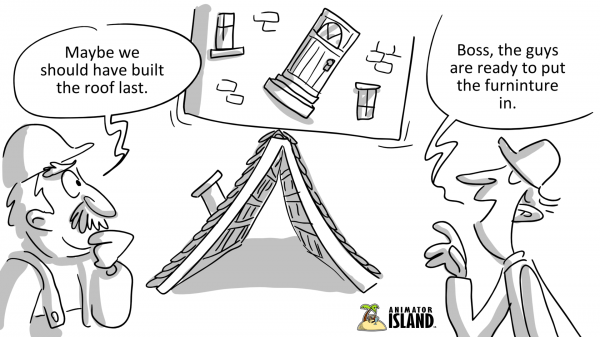Planning a Production: Why Plan at All?
Do you enjoy planning your production? And I’m not talking about anything content related like research or animatics, I mean schedules, shotlists, cost calculations and the like. Let me guess, the actual work like writing, acting, and posing sounds a lot more fun. However, I can tell you from my own painful experiences that chaotic, unplanned productions will end in chaos, delays or even a dead end and lots of wrecked nerves. That`s why you need to plan and that`s why it`s about time that we dedicate an entire series to this complex but vital issue. Behold our first topic: Why plan?

Any work with a foreseeable structure (e.g. narrative) can and should be planned if you want to finish it one day. Yes, there might be some people that started making something just like that, and had a fun time with an awesome result, but most animators (me included) are more likely to pile up a million unfinished side projects. Another exception might be project that may not need a detailed plan because of its deliberately open nature like those One-Drawing- or One-Second-A-Day exercises, or anything “artsy” that is simply complete whenever you stop working on it.
Yet even for those you need to schedule some time or you will most likely stop working on them.
A huge disadvantage of unorganized projects is the constant uncertainty. If there is no planning you might hugely underestimate the amount of work still ahead of you and that`s reason number one why private projects don’t get finished. If you knew the workload, you could act accordingly. Sometimes it’s just good to see that the problem isn’t you being slow, but just things needing time. With a production road-map in your hands you would at least know that you are still on your way and at what rate your are reaching your goal. It’s incredible how motivating a decreasing number here and a green check mark there can be. We humans love that stuff.

What a lot of people don’t realize is that planning is something flexible and not something that puts you in a cage. In the beginning it helps you dynamically think through different scenarios. Just by scribbling down some rough numbers you can guesstimate how more simple designs or less-realistic animation styles could reduce the work load overall. We will explore this in depth in the next article of this series. All this comes before you get yourself into working on something that is impossible to finish. In a way planning is part of the creative process.
For a more complex project it allows you to find out how many people you need to help you (and where and when) to get stuff done. Here, you really need planning… how can you collaborate with others effectively if you can’t even estimate when your part of the work will be finished?
With planning in place, during the production you can react to delays quickly and in an informed manner. If there is a problem somewhere in the workflow you can immediately see what it means for your whole production, just by shifting every subservient work task accordingly. You can also test how much time could be saved by cutting low-priority tasks.
So, as you can see planning doesn’t just make things easier, it`s the necessary, professional way to work. Unfortunately, even some Hollywood companies still burn through their workers in horrific crunch-times because of bad or non-existent planning. I have to admit those big projects are more difficult to plan because of so many factors involved, but there is no excuse to not make schedules for smaller or even personal projects. Sit down, grab a coffee, and find out with brutal honesty what`s actually ahead of you – these few hours you spend planning can save you months and years of drifting. And if you have a team, you owe it to them. They sacrifice their precious time on Earth for your project so don`t leave them hanging in Limbo.
In conclusion organizing and planning your project has the following advantages:
- You know what you are getting yourself into right from the beginning.
- You can decrease workload by simplifying production factors before you are in the middle of a pace that you won`t be able to keep up with.
- You know when and that there will be a result.
- You know your position on the timeline and that you are actually getting something done.
- You can react to delays in an informed manner and generate a realistic Plan B just by shifting things around in your original plan.
- You are less tempted to demand an unrealistic work speed from yourself or others.
- You can precisely coordinate not only yourself but also helpers, employees, and co-workers to get pretty massive workloads done as effectively as possible.
Do you always have every detail planned out, or have you gotten away with little to none so far? What are your experiences with chaotic productions? Let us know in the comments below. And for everybody who is interested to put structure into your projects: Stay tuned for our next article, where we explore making an early rough-production plan.








Great advice guys! I would add on to plan out day, week and month goals. Especially when it comes to an animation production. I know for myself it can be really be overwhelming seeing how much needs to be done and can really stop you in your tracks. Especially if your the only one working on the production. So I break down all of the animation shots into categories of what I think are EASY, MEDIUM, and HARD. Then each day, I will pick the hard shots first to try to knock them out. I make a goal of finishing the animation by the end of the week or at least the rough pass. Thats my week goal. Some of my day goals are getting a shot started and at the end of the day get the rough keys in. If you break down the work into small chucks then it doesn’t seem that big of a task and its easier to complete.
Great point, Chris. One of the things I think a lot of artists struggle with (at least I know I do) is getting the most difficult thing done FIRST. How often do we cave and say “Well, I’ll just get this easy thing done really quickly?” and then at the end of the day or week all we have are really hard tasks! By then our willpower can be drained, and suddenly what seemed doable is overwhelming. It would make a good article actually! 🙂
Oh I definitely know the feeling of caving towards the easy fun shots while tackling the difficult ones first. I will sometimes do is during the animation day, I will set a goal for that day for the difficult shot. Like I will get half the difficult shots inbetweens done today. If I reach that goal then I will reward myself with working an hour on one of the easier fun shots. Then after the hour is done, I start back on that hard shot again and set up a new goal. Killing two birds with one stone. I been practicing this with my freelance drawings, personal projects (Tracking Jaws), and my youtube channel. Granted I broke them down into days of the week but by doing this I am keeping my motivation up as well as getting excited for the next day.
Hey Chris, thanks for your comment! 🙂 There actually will be a whole article just about planning during a production in which we will have a look at a system that’s pretty much like this. Indeed… It’s so important to break things into difficulty levels and smaller chunks (and then also actually do the hard ones like JK says in his comment). It can still be a big challenge for every new production, because what’s a tough shot in one project, can be a piece of cake with a different animation style or technique. I am in a production right now where I probably didn’t split my work into small enough daily chunks, so it’s still getting pretty overwhelming, but oh well… that’s what learning is for. 😉 I really appreciate that you shared your approach with us. Animators definitely need to talk more about this kind of stuff.
Oh awesome! I can’t wait to read it! Are you going to have examples set up of a production plan? Maybe even have an animatic and how you would determine how difficult a shot can be and how to break it down? I am curious to see how you would approach it? I know the feeling of not breaking down work into smaller chucks and feeling overwhelm. My professor gave the best advice and she said to always “work smarter, not harder”. She always advocated trying to find solutions while you work so that your not burning yourself out. Planning stuff a head of time and finding some tricks to make the work flow easy for you. =D. We as animators definitely need to talk more about this stuff and to collaborate on better solutions to workflow.
There should be an app for this, that would be awesome! I don’t mind planning by hand though.
Oh man, an App made for planning animation would be amazing. It could have a little assistant in the beginning that asks you about every detail of your production and then puts it all together and keeps it up to date. I know there are programs like Shotgun that are super expensive and super complex but I can totally imagine something smaller targeted to indie animators. I think big studios like Pixar programmed something for their pipeline so John Lasseter could approve shots on the go
I think in many (even professional) productions it comes down to Excel or Google Spreadsheets. I have seen some real high tech things with scripts that keep you automatically up to date and write stuff into calenders and what not, but just a simple list can already be a super important planning step. By the way, we will talk about all this stuff in another article, so stay tuned… 😀
Although planning is a luxury you can’t afford at many production environments these days. I’d say you have budget your time in terms of ‘tent pole’ shots (i.e. The ones you leave out for whatever reason) and then focus on the rest of the shots where you don’t have to go all out. And remember, ‘hard shots’ not necessary improve the story, most of the times all they give you is bragging rights and nothing more.
WHY PLAN INDEED LOL. I think planning to much makes it so you don’t have as much life in a production. It takes all the fun out of it! I say just go animate the movies!
Good post! Something as important as this is more often than not completely ignored. I agree, would be great to have an app for animation planning ;D
OH..Thank you so very much for this wonderful advice, which people like me always ignore and directly sit on computer in the time of tight deadlines..
Let me share you my story!
Planning was extremely helpful to me when I participated in 11SecClub Feb competition. I had just 8 days to do everything from scratch. And to take out time from my busy job schedule was equally challenging. I just had rough concept in my mind. So I noted down total Hrs I could take out everyday and I wrote down phases of animation I will have to complete. And you know what? You were right. It all seemed sorted out and all I had to focus was just completing the task in my time rather than how many phases are incomplete or no. of days left. I luckily was able to take out double the time than my planning. In all, after total 24 working hours in these 8 days, I submitted my entry on time and with satisfaction!!
Thanks a tonne to you guys. You rock!
Thanks for sharing your story 😀 Great to hear that it worked out!
Small projects are excellent for practicing planning… and of course for practicing actual animation too. 😉
Do you have the link to your entry?